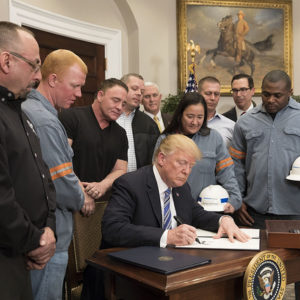Everyone knows President Donald Trump enacted steel and aluminum tariffs to level the playing field with China and other U.S. trading partners. But though economists don’t agree that tariffs are the right approach, new research affirms the view that U.S. aluminum producers are at an unfair disadvantage in the global market.
A pro-global trade organization — the Organization for Economic Cooperation and Development (OECD) — just released a report showing that many U.S. trading partners including China and Canada have been subsidizing their aluminum industries since 2013.
In response to the report, the American Primary Aluminum Association (APAA) released a statement claiming this justifies imposing aluminum tariffs on exports from those countries. In their words, it “levels the playing field” for American producers.
According to the APPA, the subsidies have reduced global aluminum capacity, which has protected foreign aluminum industries while hurting the U.S. aluminum industry. Data from the London Metal Exchange reported by Bloomberg shows aluminum inventories have sharply declined since 2014.
But instead of imposing tariffs to fix the problem, the Cato Institute’s Associate Director of the Herbert A. Stiefel Center for Trade Policy Studies, Simon Lester, said the U.S. should have followed convention and filed a complaint with the World Trade Organization (WTO).
“The problem of governments subsidizing industries is a long-standing problem across all countries and cultures,” Lester told InsideSources. “There are rules with the WTO about subsidization, and if you think a country is subsidizing, you can file a complaint directly with the WTO. The Obama administration started that process at the end of Obama’s term, but we haven’t followed up with that. The specific approach the Trump administration has taken is kind of arbitrary and not correlated with the systemic problem.”
But Trump’s presidency is defined by defying Washington convention — and not all economists and international trade experts believe the WTO fairly settles trade disputes.
Before becoming the United States Trade Representative for the Trump administration, Robert Lighthizer criticized the WTO’s approach to handling trade disputes, calling the WTO a system that has “fundamentally lost its way.”
And he’s not the only one. Many experts and organizations have decried the WTO for the lack of transparency in its decision-making and arbitrary decisions.
Regardless, Lester thinks going to a third party is still the best bet for making trade decisions.
“I think the right response is going to the WTO,” he said. “Governments can be a little biased toward their own industries.”
Last year, former National Economic Council Director Gary Cohn said Trump’s tariffs are “just his negotiating style” in an attempt to level the playing field for American producers and manufacturers. In Cohn’s view, global trade is currently neither free or competitive, but said tariffs aren’t the answer because they will ultimately hurt U.S. companies and consumers.
Many other economists agree. Lawrence White, professor of economics at New York University’s Leonard N. Stern School of Business, told InsideSources in an email that the OECD’s report is “no surprise” but doesn’t think tariffs will fix the problem.
“Should we complain that this is ‘unfair’ and we should threaten restrictions on imports of primary aluminum and then follow-through with restrictions?” he said. “Of course, such restrictions favor our primary aluminum producers (and their workers) but harm the downstream processors and users of aluminum (and their workers) and harm the eventual consumers of aluminum-using products (who have to pay higher prices).”
White thinks the U.S. shouldn’t double down on aluminum and should instead “re-orient our productive facilities to produce other things — and we should find ways to ease the economic/social transition of the primary aluminum workers and producers.”
But allowing an entire industry to fail has severe repercussions as well — for the workers as well as downstream industries, like the auto industry and companies that use aluminum in their products, such as Campbell’s soup cans.
Another other option is reducing reliance on global trade altogether.
A 2016 study conducted by economists from the Massachusetts Institute of Technology (MIT) found that increasing trade with China handicapped U.S. manufacturing and cost the U.S. millions of jobs in the 90s and early 2000s. The study also found that various industries downstream of the manufacturing industries were negatively affected.
In other words, trade with China has been bad for U.S. industry, and subsequent subsidies supporting the Chinese aluminum industry and other foreign aluminum industries have forced the U.S. aluminum industry to the brink of collapse.
But instead of imposing tariffs to mitigate the damage, economists — like Lester — think Trump should rely on trade partnerships to hold trading partners accountable.
“There’s only so much you can do here,” Lester said. “All governments use tariffs and subsidies. International trade rules try to put constraints on that.”

